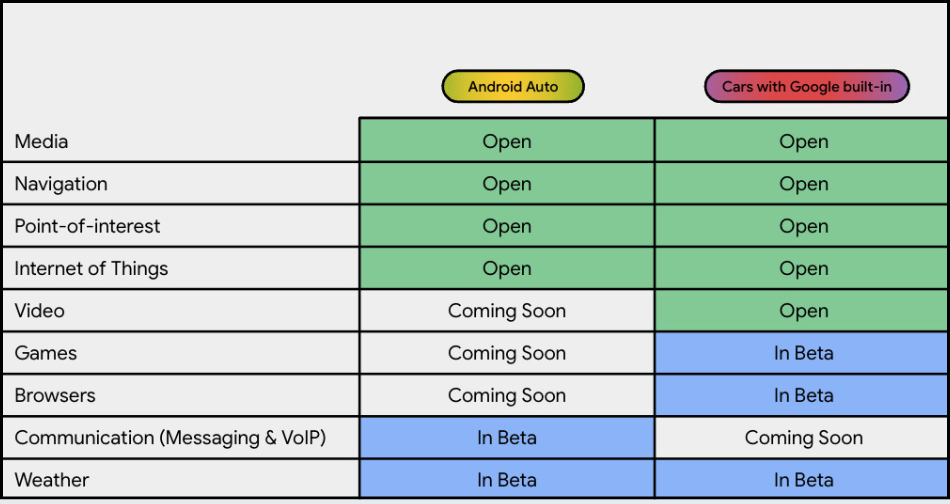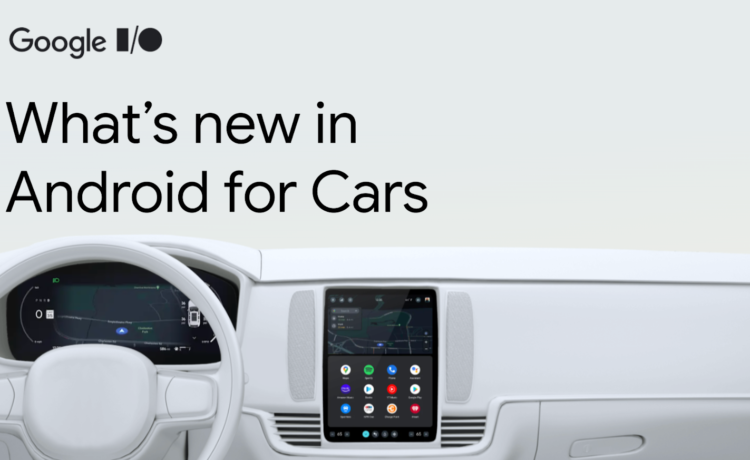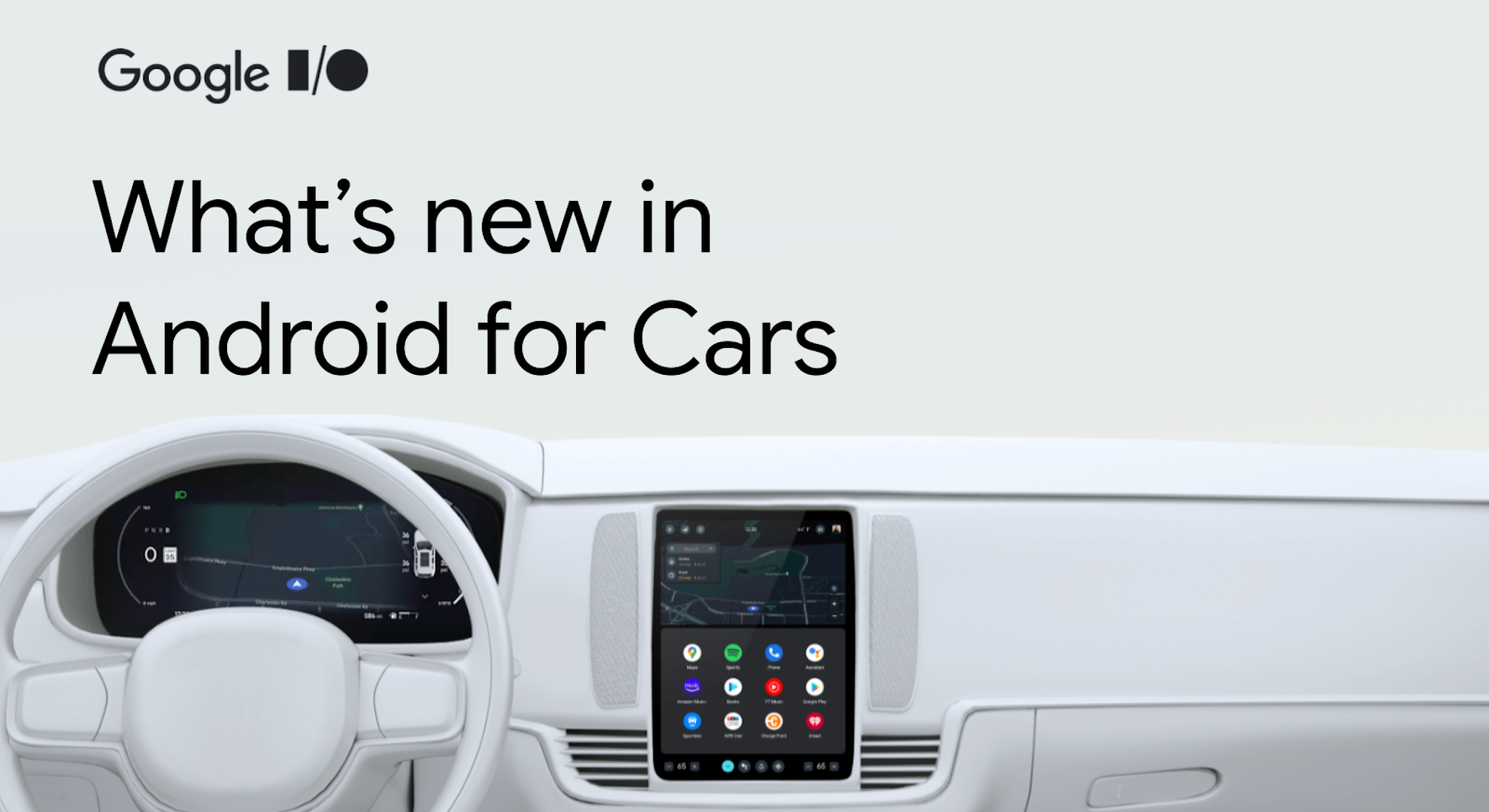Posted by Vivek Radhakrishnan – Technical Program Manager, and Seung Nam – Product Manager
With technology in cars becoming more capable, the opportunity to deliver safe and seamless connected experiences for drivers and passengers is greater than ever. Google remains committed to the automotive industry and is seeing momentum across Android Auto and cars powered by Android Automotive OS with Google built-in. We’re excited to share updates across our in-car experiences and introduce new programs and resources to make it easier for you to bring your apps to cars. Learn more below and in the Android for Cars Technical Session.
Momentum and updates
With over 200 million cars on the road compatible with Android Auto, and nearly 40 car models like the Nissan Rogue, Renault R5, Acura ZDX, and Ford Explorer offering Google built-in, the time to bring your apps to cars is now.
Over the last year, the ecosystem of apps available across these experiences has grown – thanks to you. New entertainment apps like Max, Peacock and Angry Birds are coming to select cars with Google built-in. On Android Auto, the Uber Driver app is now available, allowing drivers to accept rides and deliveries, and get turn-by-turn directions on a bigger screen.

We’re also pleased to share that Google Cast is coming to cars with Android Automotive OS, starting with Rivian with more to follow. This allows you to easily cast video content from your phone or tablet directly to the car while parked. If you don’t already offer casting in your app, this is a simple way for your content to reach new audiences in the car.
Coming soon – you can stream content from apps on your phone, like Pluto TV, to Rivian cars via Google Cast.
New car app quality tiers
There are unique considerations when developing apps and experiences for cars including safety, numerous screen sizes, and more. Our priority is developing resources and tools that take these considerations into account and minimize the work needed for you to bring your apps to cars.
We’re introducing new quality tiers, inspired by those that exist for large screens, to streamline the process of bringing existing apps to cars by highlighting what makes for a great user experience in cars. Here are the tiers and what they encompass:
- Tier 1: Car differentiated
This tier represents the best of what’s possible in cars. Apps in this tier are specifically built to work across the variety of hardware in cars and can adapt their experience across driving and parked modes. They provide the best user experience designed for the different screens in the car like the center console, instrument cluster and additional screens – like panoramic displays that we see in many premium vehicles.
- Tier 2: Car optimized
Most apps available in cars today fall into this tier and provide a great experience on the car’s center stack display. These apps will have some car-specific engineering to include capabilities that can be used across driving or parked modes, depending on the app’s category.
- Tier 3: Car ready
Apps in this tier are large screen compatible and are enabled while the car is parked, with potentially no additional work. While these apps may not have car-specific features, users can experience the app just as they would on any large screen Android device.
To learn more about the quality tiers, see Android app quality for cars.
Car ready mobile apps program
Let’s dive deep into Tier 3 apps. In collaboration with car manufacturers, we’re introducing the Car ready mobile apps program to accelerate bringing mobile apps to cars with no additional work for developers.
As part of this program, Google will proactively review mobile apps that are already adaptive and large screen compatible to ensure safety and compatibility in cars. If the app qualifies, we will automatically opt it in for distribution on cars with Google built-in and make it available in Android Auto, without the need for new development or a new release to be created. This program will start with parked app categories like video, gaming and browsers with plans to expand to other app categories in the future.
The program will roll out in the coming months, but if you already offer a large screen compatible adaptive app and it falls into one of these categories, you can request a review to participate sooner. As this program rolls out, availability of your app will depend on platform compatibility.
To learn more about building qualified mobile apps, check out the technical session titled “Building Adaptive Android Apps”. You can find guidance on what to look out for at developer.google.com

New tools and emulators
To create high quality experiences in cars, we are also introducing some new tools that can help you along the way.
- First, we have a new emulator for distant and panoramic displays so developers can visualize and test for the growing sizes and number of screens in the car and make sure apps can adapt to the variety of displays for the best experience.
- We also have a new tool that addresses the wide range of screen shapes and user interfaces (UI) present in cars. Many new car displays have unique curves, insets and angles that impact the UI, so we have an emulator that lets you change the emulator screen to match OEM screen designs. This will help ensure the apps work well on real cars without needing to set up specific OEM emulators or bringing in real cars for testing.
- Lastly, we’re introducing an Android Automotive OS system image for Pixel Tablet. This will let you physically interact with your app as you would on a car screen. We are opening this up for early access partners for the purpose of development and testing today, and you can request to participate here.
To learn more about how to use these tools, check out the “Build and test a parked app for Android Automotive OS” codelab that will be published tomorrow.
More app categories for cars
As you consider bringing your app to cars, we put together a table to help you understand what app categories are currently open and accepting app submissions across both Android Auto and cars with Google built-in. We will continue to expand the type of apps that can be enabled in cars, so if your app isn’t in one of these categories, stay tuned for future opportunities!

Start developing apps for cars today
To learn how to bring your apps to cars, check out the documentation on the Android for Cars developer site and the Android for Cars Technical Session. With all the opportunities across car screens, there has never been a better time to bring your apps and experiences to cars. Thanks for all the contributions to the Android ecosystem. See you on the road!




